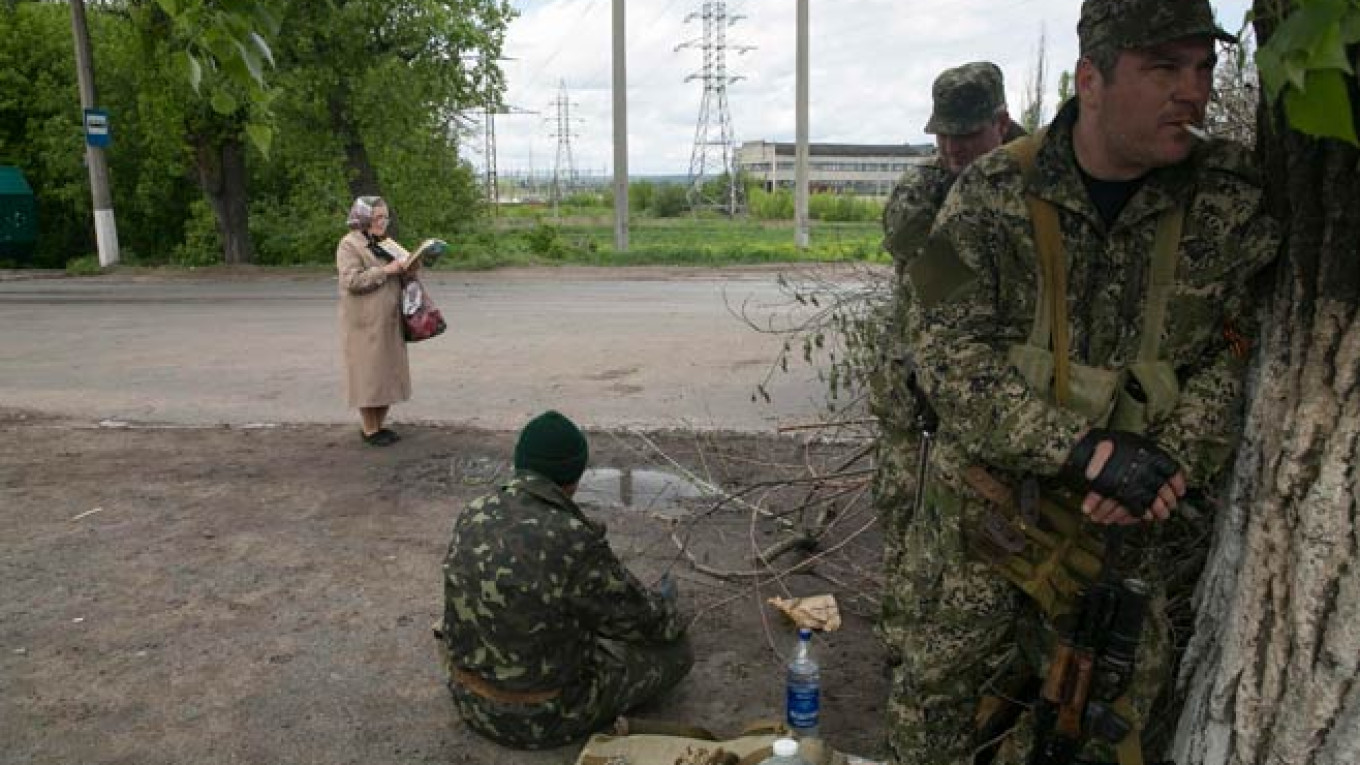Ukraine sent an elite National Guard unit to re-establish control over the southern port city of Odessa on Monday and troops fought pitched gun battles with a pro-Russia militia that had seized an eastern city.
The twin moves reflected an apparent escalation of efforts to bring both regions back under Kiev's control. The possible loss of Odessa in the southwest and parts of eastern Ukraine could be catastrophic for the new government, leaving the country landlocked, cut off entirely from the Black Sea.
Ukraine already lost a significant part of its coastline in March, when its Black Sea peninsula of Crimea was annexed by Russia.
Gunfire and multiple explosions rang out Monday in and around Slovyansk, a city of 125,000 that has become the focus of the armed insurgency against the new interim government in Kiev.
Interior Minister Arsen Avakov said in a statement that government troops were battling about 800 pro-Russian forces, which were deploying large-caliber weapons and mortars. His agency reported four officers killed and 30 wounded in the fighting.
A pro-Russian militia spokesman in Slovyansk said an unspecified number of people were killed and wounded in the clashes, including a 20-year-old woman killed by a stray bullet.
Both sides indicated fighting was taking place at several sites around the city. An Associated Press crew saw at least four ambulances rushing injured people to a city hospital and one militiaman being carried in for medical treatment.
This nation of 46 million is facing its worst crisis in decades after its Russia-leaning president, who hails from Ukraine's industrial east, fled to Russia in February following months of street protests. Those eastern regions are now at odds with Ukraine's western and central areas, which seek closer ties with Europe and largely support the new interim government in Kiev.
The goal of the pro-Russian insurgency is ostensibly geared toward pushing for broader autonomy, but some insurgents do favor seceding from Ukraine and joining up with Russia.
In the last few weeks, pro-Russian forces have stormed and seized government buildings and police stations in a dozen eastern Ukrainian cities. Authorities in Kiev accuse Moscow of backing the insurgents and — since Russia has kept tens of thousands of troops along Ukraine's eastern border — fear that Russia could try to invade and grab more territory.
For weeks, the Black Sea port of Odessa had remained largely peaceful even as violence erupted across east Ukraine. But 46 people died Friday after riots broke out there between pro-Russian and pro-Ukraine groups and a government building was set on fire.
With tears and red roses, pro-Russian activists gathered Monday in Odessa for the funeral of a regional member of parliament, Vyacheslav Markin, who died two days after the fire from his burns. Markin was known for speaking out against the central government in Kiev.
Activists shouted "Hero! Hero!" and vowed to avenge his death.
"Kiev does not control the situation in the country, Kiev controls only one half of Ukraine," said 32-year-old Dmitry Sheiko, who was wearing the St. George black-and-orange ribbon, a ubiquitous symbol of the pro-Russian protest movement. "Even in Odessa they cannot maintain order, which means that we will restore order ourselves."
Despite those promises, the city remained calm on Monday and the pro-Russian forces made no attempt to occupy government buildings in Odessa. People gathered around the scorched building to lay flowers and commemorate victims of the fire, but the crowd was peaceful despite the anger of many.
"This is a tragedy for all of Ukraine," said Nadezhda Yelenchuk, a 42-year-old schoolteacher. "This is the result of a civil war that has already begun in Ukraine. We need a powerful government that will stop the bloodshed."
Riots over the weekend brought into question the loyalty of Odessa's police forces. On Sunday, pro-Russian demonstrators stormed the Odessa police headquarters and freed 67 people who had been detained in the rioting.
The Interior Ministry said in a statement Monday it was sending an elite National Guard unit from Kiev to re-establish control in the city, and said 42 others arrested during the rioting were being sent to another region for investigation, presumably to prevent local police from releasing more prisoners.
The international community has accused Russia of fomenting the unrest in an attempt to destabilize Ukraine and derail the upcoming May 25 presidential elections. Russia, however, has vociferously condemned Ukraine's security operations in the east and blamed the central government in Kiev for not preventing the Odessa fire.
On Monday, the Russian Foreign Ministry published a 70-page report that it said listed human rights violations by "ultra-nationalist, neo-Nazi and extremist forces" in Ukraine. The Kremlin wrote that the ministry report "confirms that … violations of basic human rights in Ukraine have become widespread."
While President Vladimir Putin has made no public comment on the situation in Ukraine since the Odessa fire, several Russian politicians have ramped up their anti-Ukraine rhetoric and Russian state media outlets have referred to the fire as genocide.?
Also see:
A Message from The Moscow Times:
Dear readers,
We are facing unprecedented challenges. Russia's Prosecutor General's Office has designated The Moscow Times as an "undesirable" organization, criminalizing our work and putting our staff at risk of prosecution. This follows our earlier unjust labeling as a "foreign agent."
These actions are direct attempts to silence independent journalism in Russia. The authorities claim our work "discredits the decisions of the Russian leadership." We see things differently: we strive to provide accurate, unbiased reporting on Russia.
We, the journalists of The Moscow Times, refuse to be silenced. But to continue our work, we need your help.
Your support, no matter how small, makes a world of difference. If you can, please support us monthly starting from just $2. It's quick to set up, and every contribution makes a significant impact.
By supporting The Moscow Times, you're defending open, independent journalism in the face of repression. Thank you for standing with us.
Remind me later.


